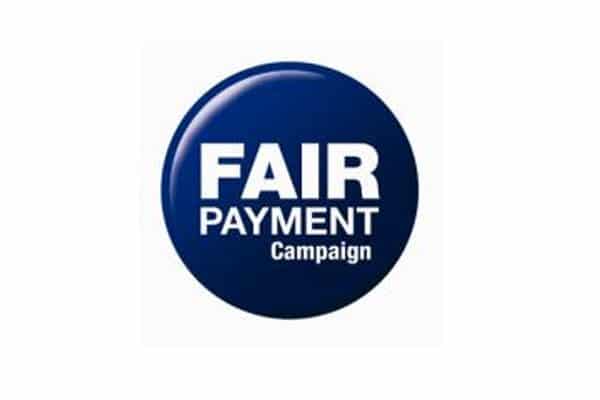Carillion Early Payment Facility

– Information for Specialist Contractors
Background
Earlier this year, NSCC published a statement on extended payment terms following reports that Carillion had increased its maximum payment terms to suppliers to 120 days as part of its new Early Payment Facility (EPF). NSCC promotes 30-day payment terms as part of the Fair Payment Campaign and views extended payment terms as ‘grossly unfair’ to the supply chain in accordance with the Late Payment of Commercial Debts Regulations 2013.
NSCC has met with Carillion which has confirmed that its suppliers are engaged on 120-day payment terms under the EPF. However, the arrangements that Carillion has put in place with various banks* mean that suppliers can receive payment earlier than 120 days by applying to the appropriate bank after their invoice has been approved by Carillion. The bank will then pay suppliers directly minus a charge which is set out on a sliding scale depending on how early they wish to be paid. At present, Carillion has committed to reimbursing bank charges paid by suppliers for accessing their money in accordance with their existing payment terms under its Supplier Incentive Scheme.
Carillion has stated that its intention is to pay suppliers earlier under the EPF than they would have been previously on Carillion’s standard payment terms of 65 days. Although it is not contractually documented anywhere, Carillion has told NSCC that it is reimbursing all bank charges paid by suppliers who reduce their actual payment terms to 45 days. Whilst this is potentially encouraging, Specialist Contractors should understand that they are extending the payment terms in their contract to 120 days and there are a number of potential issues that they should be aware of before signing up to the EPF.
What issues should Specialist Contractors be aware of?
Bank charges – Under its Supplier Incentive Scheme, Carillion has committed to reimbursing the bank charges paid by Specialist Contractors who reduce their actual payment terms under the EPF in line with their existing terms. However, the Supplier Incentive Scheme is not contractually documented anywhere and, if Carillion chose to withdraw it, the bank charges would have to be met by the Specialist Contractor.
Termination – Either Carillion or the Specialist Contractor can terminate the EPF Agreement by giving the other 30 days’ written notice. The EPF Agreement automatically terminates in the event that the bank terminates its facility agreement with Carillion or if either party becomes insolvent. However, termination of the EPF Agreement does not affect the underlying sub-contract terms with Carillion. This means that, if Carillion decides to end the EPF, Specialist Contractors will be stuck with 120-day payment terms on existing contracts, which could clearly present cash flow difficulties.
If the nominated bank is Lloyds TSB, there are various termination events in their agreement and the Specialist Contractor or Lloyds TSB can terminate the agreement on 90 days’ written notice without reason.
Limited facility – Carillion has confirmed that it does not have the facility to offer the EPF to all their suppliers. However, it would appear that Carillion is seeking to extend its payment terms across the board even though not all of its suppliers will be able to benefit from the EPF.
Extended payment terms – Extending payment terms to 120 days can mean that Specialist Contractors will not be able to claim that a dispute has crystallised, and therefore adjudicate, until this timeframe has passed.
Due date – In respect of contracts which are subject to the Construction Act, the due date for payment is 112 days from the end of the month in which the invoice is issued or the date of the application for payment. This is arguably at odds with Carillion’s statement in the Supplier Incentive Scheme that it will endeavour to approve invoices within 30 days. As Carillion is not contractually obliged to approve an application for payment until 112 days later, Specialist Contractors may not be able to draw down under the EPF. It also prevents Specialist Contractors claiming interest on late payments until after 112 days have passed.
Set off – If the nominated bank is Lloyds TSB, Lloyds TSB can set off its liabilities under the agreement against any liability the Specialist Contractor owes Lloyds TSB as well as combine and consolidate any of the Specialist Contractor’s accounts with Lloyds TSB. This could potentially allow Lloyds TSB to set-off amounts due under the EPF from other liabilities the Specialist Contractor has with Lloyds TSB, including any overdraft facility. Specialist Contractors who bank with Lloyds TSB should therefore take extra care when deciding whether to sign up to the EPF.
Debt factoring – Specialist Contractors ‘cannot assign, sell or otherwise transfer their rights’ in respect of invoices (e.g. to debt factoring companies). Under the agreement with Lloyds TSB, the Specialist Contractor indemnifies Lloyds TSB for all costs and liabilities incurred as a result of Lloyds TSB having to take action to ensure that any other person or third party claiming to have a security interest over an invoice subject to the EPF waives their rights in respect of the invoice.
How does the EPF work?
Carillion and the Specialist Contractor enter into a contractual agreement in respect of the EPF. The Specialist Contractor also enters into an agreement with the bank nominated by Carillion and the EPF Agreement applies from the date of this agreement.
Once the Specialist Contractor has signed up to the EPF, they can reduce their actual payment terms from 120 days but only once the invoice has been approved by Carillion and uploaded onto the nominated bank’s system. It is important to note that the Specialist Contractor has no control over this process.
The bank makes payment of the invoice direct to the Specialist Contractor minus a charge for the early payment.
If an invoice has not been paid by the 120-day final payment date, the Specialist Contractor must notify Carillion which will make payment in place of the bank. However, if the nominated bank is Lloyds TSB, it has the ability to pay on the 120th day and deduct transaction charges. In this situation, it also reserves its right to wait to be paid by Carillion for the relevant invoice before it pays the Specialist Contractor.
If any duplicate payments are made, the Specialist Contractor is to refund these to Carillion within seven days of receiving a request to do so. Payment of any invoice by the bank does not prevent Carillion from claiming repayments from the Specialist Contractor in respect of any defects and Carillion can still issue a withholding/pay-less notice.
Why 120-day payment terms?
Carillion has agreed a significant facility with various banks in order to offer the EPF to its suppliers.
A requirement of the EPF is that Specialist Contractors agree to change their payment terms to 120 days. This reflects the period within which Carillion has to pay the bank in settlement of the amounts that the bank pays to its Specialist Contractors under the EPF. It is not intended to determine the date on which Specialist Contractors are paid as the purpose of the EPF is that Specialist Contractors can arrange their payment dates to suit their circumstances.
Carillion has confirmed that this gives them greater flexibility in terms of managing their own working capital.
What is the Supplier Incentive Scheme?
Carillion is currently offering a Supplier Incentive Scheme, under which it will reimburse the bank charges to Specialist Contractors who reduce their actual payment terms under the EPF in line with their existing terms.
Whilst it is not clear from the Lloyds TSB agreement whether the Specialist Contractor will be reimbursed for 100% of the bank charges, NSCC understands that this will be the case where the Specialist Contractor requests payment in line with the existing terms. Carillion has stated that it is currently reimbursing all bank charges paid by suppliers who reduce their actual payment terms to 45 days but this is not contractually documented anywhere.
Specialist Contractors should be aware that the fact that the Suppler Incentive Scheme is not contractually documented anywhere and may be subject to review ‘in line with market conditions’ means that Carillion could withdraw it at any time or reduce the amounts payable. In this event, Specialist Contractors would either have to accept payment on 120-day terms or pay bank charges for taking early payment.
What does a Specialist Contractor need to sign?
In order to join the EPF, a Specialist Contractor will be required to sign the following three documents:
1. A Deed of Amendment which varies the payment terms of all their existing contracts with Carillion to 120 days. It provides that the final date for payment will be 120 days from either the end of the month in which the invoice is issued or the date of the application for payment (depending on the relevant existing payment structure).
2. The EPF Agreement
3. An agreement with the bank which enables the Specialist Contractor to obtain payment directly from the bank.






